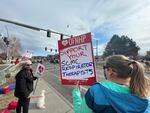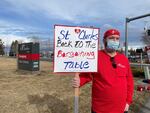When Frank DeWolf goes to work, every second counts. He suits up in a mask and gown, and meets people having heart attacks.
“If you have a heart attack anywhere near Bend, you will come see us,” said the electrophysiology lab technician at St. Charles Health System, which serves as the hub for health care across Central and Eastern Oregon.
“Our job is to get access to the heart, and open up the vessel that’s closed within 90 minutes of diagnosis,” DeWolf said. He described a routine of preparing patients, and assisting doctors and nurses in life-saving procedures that can prevent the need for open heart surgery. Twelve-hour shifts are typical. Even when he’s not working, DeWolf is often on call, and a pager can send him rushing to a patient within half an hour.
This week, he stood in front of the Bend hospital, a short walk from the cardiac catheterization lab where he’s worked for the last nine years. But, he wasn’t on the clock. He was picketing.
More than 100 people and many other health care workers with technical jobs like DeWolf’s joined him, as contract negotiations between their union and the St. Charles Health System continue.

More than 100 people picketed near St. Charles Medical Center in Bend on Jan. 30 and Feb. 1, to support medical technicians who say their wages have fallen behind living costs like housing, food, and childcare.
Emily Cureton Cook / OPB
DeWolf said that in nearly a decade, his wages have fallen compared to the cost of living in Central Oregon. He cited a gross annual pay that is within $5,000 of what he’s been making since 2012. His average gains are well below percentages for cost of living adjustments the federal government has added to retiree benefits to keep up with inflation.
“Bend has become one of the most expensive cities in Oregon to live. And when the wages don’t go up to match, it’s making it very hard to live here,” DeWolf said, adding that if his wife didn’t stay home, the cost of child care would be out of reach.
A state regional economist said consumer prices in Bend dramatically outstep other towns of similar population, and tend to exceed West Coast metro areas with far more people.
St. Charles X-ray technician Chriss Curry said half of his income goes to a mortgage, and he still commutes 34 miles every shift from the neighboring town of Redmond.
“I can’t afford to live on one income in Bend,” Curry said.
Formerly of Seattle, the technician with about 20 years experience said he accepted a big pay cut — about 30% — to take the same type of position in Central Oregon, because “I grew up here, and what a great place to live in a different time in your life.”
Curry and DeWolf’s positions are among 154 technical jobs at St. Charles that were recently unionized, after workers said they’ve gone years without adequate pay increases or contractual protections against forced overtime. The positions are mostly hourly. They vary greatly in terms of qualifications and duties. Some are highly trained, essential caregivers for COVID-19 patients, such as respiratory therapists, and X-ray or computerized tomography (CT) technicians.
The bargaining unit was formed in 2019 by the Oregon Federation of Nurses & Health Professionals, which includes more than 5,000 health care workers in Oregon and Southwest Washington. But union organizers say this conflict over wage steps and cost of living adjustments is unique to St. Charles, and that technical workers at other health systems, such Kaiser, already have fair wage formulas.
St. Charles offered what could become its first contract with the health professionals union in early December, but that offer hasn’t been well received.
“St. Charles has categorically rejected any kind of structured pay increases, and that’s a nonstarter for us. ... In exchange they’ve proposed this kind of proprietary market analysis,” said union organizer Sam Potter.
He added the hospital system’s negotiators used market analyses to justify their contract offer, but declined to provide those analyses to the union, instead telling organizers they can purchase them from three private firms at a cost of thousands of dollars. Potter said the health system’s first offer includes a .5% annual cost of living increase, well below the adjustments promised to nurses represented by another union, the Oregon Nurses Association.
“These people do a lot of the same work as nurses, but don’t have the same title,” Potter said, “They’re fighting for their right to stay in the community that they serve every single day.”
St. Charles Bend President Aaron Adams declined to be interviewed. In a written statement, he said the health system “has met all of its obligations to bargain and to provide OFNHP with information.” Citing confidentiality of negotiations, Adams declined to answer specific written questions about worker wages and other union claims. He wrote that technical employees in the bargaining unit “have historically received a combination of general increases and market adjustments intended to help us recruit and retain highly qualified caregivers.”
As the largest employer in Central Oregon, St. Charles outsizes the next nearest company by thousands of employees.
It’s also the only hospital system in the region, creating what Oregon Employment Department regional economist Damon Runberg refers to as a “monopsony.”
“Which is a silly name,” Runberg said. “It’s kind of like a monopoly, but it’s when an employer, or a group of employers, have a monopoly on the labor supply for a type of occupation or skill set.”
Runberg said one company’s control over the region’s health care market makes it difficult for workers to leverage their skills for higher wages, even when those skills involve serious health risks, specialized knowledge, or operating multimillion dollar machinery.
“You as the worker can’t find a different employer for your skill set. So, it’s really hard to talk a big talk, and say I’m going to leave if you don’t offer me ‘X’ pay, and they say, “OK,” because it means you are going to have to leave the market,” Runberg said.
DeWolf, the cardiac lab technician, said he’s considered moving to a hospital in Eugene.
“They do pay more, but I live in Bend. It’s a great place to raise a family. That’s the thing that’s keeping me here right now,” DeWolf said.
Curry, the veteran x-ray technician who grew up in Redmond, said connections to friends and family help him decompress from the stress of working in health care right now. He described the toll of being in the intensive care unit, where one day a COVID-19 patient he’s x-raying might be able to speak and interact, and the next day they are on a ventilator.
“People don’t see how the patient looks in the bed with a tube down their throat,” he said. “And you’ve seen them day in and day out fight for their lives, with their lungs looking cloudier and cloudier.”
Curry said the contract dispute isn’t about “exorbitant amounts of money.”
“We just want to be recognized and to be respected. We’ve been taking care of people’s families and COVID patients. The hospital should do its part in taking care of us.”

X-ray technician Chriss Curry pickets at St. Charles Medical Center in Bend on Feb. 1, 2021. He took a substantial pay cut in order to work at the hospital and move back to his hometown three years ago.
Emily Cureton Cook / OPB
